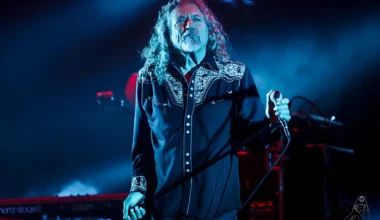Pink Floyd’s goal with every song in their catalogue was to broaden their creative horizons. They could have carried on as an oddball space rock group after Syd Barrett left, but Roger Waters thought that analysing their suffering and considering how they fit into the world in relation to their peers was the best course of action. This frequently involved a hint of drama. But to Waters, Andrew Lloyd Webber embodied everything that was worst about musical pageantry.
Granted, when Waters performed his classics, he didn’t always hit the mark perfectly. “The Wall” is undoubtedly one of the most opulent rock albums ever recorded by any group. However, there are still a few parts of the record where it seems to stall. This occurs particularly when he tries to play up the more stage-friendly aspects of the show.
As a matter of fact, Webber’s rise to prominence seemed to be a logical progression of Waters’s work. “Jesus Christ Superstar” was one of Webber’s greatest works to date, bringing the sounds of rock and roll into the theatre. This was even before “The Wall” was a fully developed concept.
However, Webber was by no means the first to think of this concept. The Beatles, with their own interpretations of classical pieces in their later output, set the way for something different. Meanwhile, Queen had already ventured into the theatrical side of rock and roll.
Speaking of the well-known composer, Waters expressed his opinion that nothing he had done was worthwhile, stating, “Andrew Lloyd Webber sickens me.” He constantly puts himself in your face and does absurd things. It is worthless. All of it is derivative, shallow garbage, and it depresses me greatly. Phantom of the Opera is a truly awful film from beginning to end.
Waters may, however, be struggling more personally with Webber’s best-known composition. The band’s signature track, “Echoes,” features a descending chord figure that is almost exactly the same as the major theme for The Phantom. If anything, Webber’s Floyd plagiarism helped him get a foot in the door and ultimately propel him to his current position.
Waters also had no intention of being tactful in his animosity. Waters addressed his disdain for Webber in his solo song “Amused to Death.” He acknowledged that he hadn’t even heard much of the composer’s work before penning the lyrics.
Waters, though, may not be extending Webber a grace period. While Evita is still very much a stage production, Jesus Christ Superstar is a great example of how to combine rock and roll with the theatre. When it comes time to bring the house down, he certainly knows how to work a hook.
When Roger Waters put on his guitar, though, he was a different person. Every time he takes the stage, Waters wants to implant an epiphany in your mind, unlike many other artists who aim to tell a story merely to amuse you.








